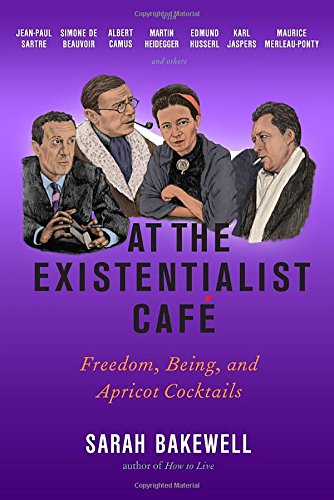At the Existentialist Cafe: Freedom, Being and Apricot Cocktails
Sarah Bakewell’s latest non-fiction book, At the Existentialist Café, documents her passion for existentialism through linked biographies of the movements’ King and Queen (Jean-Paul Sartre and Simone de Beauvoir) as well as their collaborators and adversaries, including Albert Camus, Martin Heidegger, Edmund Husserl, Karl Jaspers, and Maurice Merleau-Ponty. The author’s helpful “Cast of Characters” summarizes more than seventy others whose lives overlap with her core characters.
The existentialists’ biographies are connected by philosophy, time, and place. Reinforced by extensive footnotes, Bakewell’s work tracks existentialism’s evolution from Europe’s Great War through America’s idealism in the 1960s. Sartre’s mercurial relationships, de Beauvoir’s work on The Second Sex, survival in occupied Paris, and the scheme to save Husserl’s manuscripts from the Nazis add tension to the interwoven life studies.
Readers may come to At the Existentialist Café for accessible explanations of a potentially confounding philosophy, to understand war’s influence on academic thought, or for period color, including students climbing statues to better hear their idols; but it is the iconic philosophers whose lives will linger. As the author rightly concludes, “Ideas are interesting, but people are vastly more so.”










